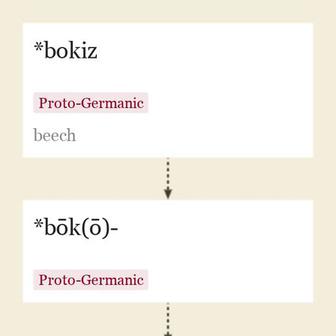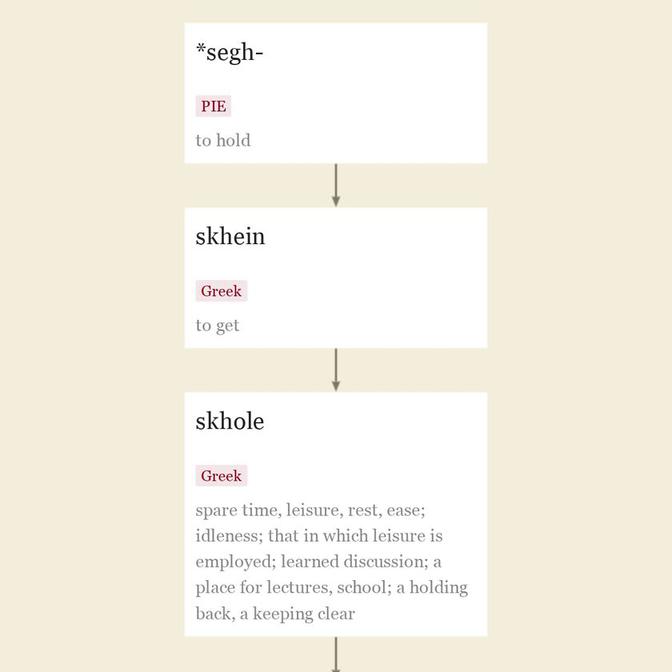Entries linking to school-book
Middle English bok, from Old English boc "book, writing, written document," generally referred (despite phonetic difficulties) to Proto-Germanic *bōk(ō)-, from *bokiz "beech" (source also of German Buch "book" Buche "beech;" see beech), the notion being of beechwood tablets on which runes were inscribed; but it may be from the tree itself (people still carve initials in them).
Latin and Sanskrit also have words for "writing" that are based on tree names ("birch" and "ash," respectively). And compare French livre "book," from Latin librum, originally "the inner bark of trees" (see library).
The sense gradually narrowed by early Middle English to "a written work covering many pages fastened together and bound," also "a literary composition" in any form, of however many volumes. Later also "bound pages," whether written on or not. In 19c. it also could mean "a magazine;" in 20c., a telephone directory.
The use of books or written charters was introduced in Anglo-Saxon times by the ecclesiastics, as affording more permanent and satisfactory evidence of a grant or conveyance of land than the symbolical or actual delivery of possession before witnesses, which was the method then in vogue. [Century Dictionary]
From c. 1200 as "a main subdivision of a larger work." The meaning "libretto of an opera" is from 1768. A betting book "record of bets made" is from 1812. The meaning "sum of criminal charges" is from 1926, hence slang phrase throw the book at (1932). Book of Life "the roll of those chosen for eternal life" is from mid-14c. Book of the month is from 1926. To do something by the book "according to the rules" is from 1590s.
[place of instruction] Middle English scole, from Old English scol, "institution for instruction," from Latin schola "meeting place for teachers and students, place of instruction;" also "learned conversation, debate; lecture; disciples of a teacher, body of followers, sect," also in the older Greek sense of "intermission of work, leisure for learning."
This is from Greek skholē "spare time, leisure, rest, ease; idleness; that in which leisure is employed; learned discussion;" also "a place for lectures, school;" originally "a holding back, a keeping clear," from skhein "to get" (from PIE root *segh- "to hold") + -olē by analogy with bolē "a throw," stolē "outfit," etc.
The basic sense of the Greek word is "leisure," which passed to "otiose discussion" (in Athens or Rome, the favorite or proper use of free time), then it came to be used for the place for such discussion.
The Latin word was widely borrowed (in addition to Old French escole, French école, Spanish escuela, Italian scuola; Old High German scuola, German Schule, Swedish skola, Gaelic sgiol, Welsh ysgol, Russian shkola).
The meaning "students attending a school" in English is attested from c. 1300; the sense of "school building" is by 1590s. Sense of "people united by a general similarity of principles and methods" is from 1610s; hence school of thought (by 1848). As an adjective by mid-18c., "pertaining to or relating to a school or to education."
School of hard knocks "rough experience in life" is by 1870; to tell tales out of school "betray damaging secrets" is from 1540s. School-bus is from 1908. School days is from 1590s. School board "local committee of education" is by 1836; school district "division of a town or city for the management of schools" is by 1809.
Trends of school-book
More to Explore
updated on February 02, 2022
Dictionary entries near school-book
scholarship
scholastic
scholasticism
scholiast
school
school-book
schoolboy
schooled
schoolgirl
school-house
schooling


